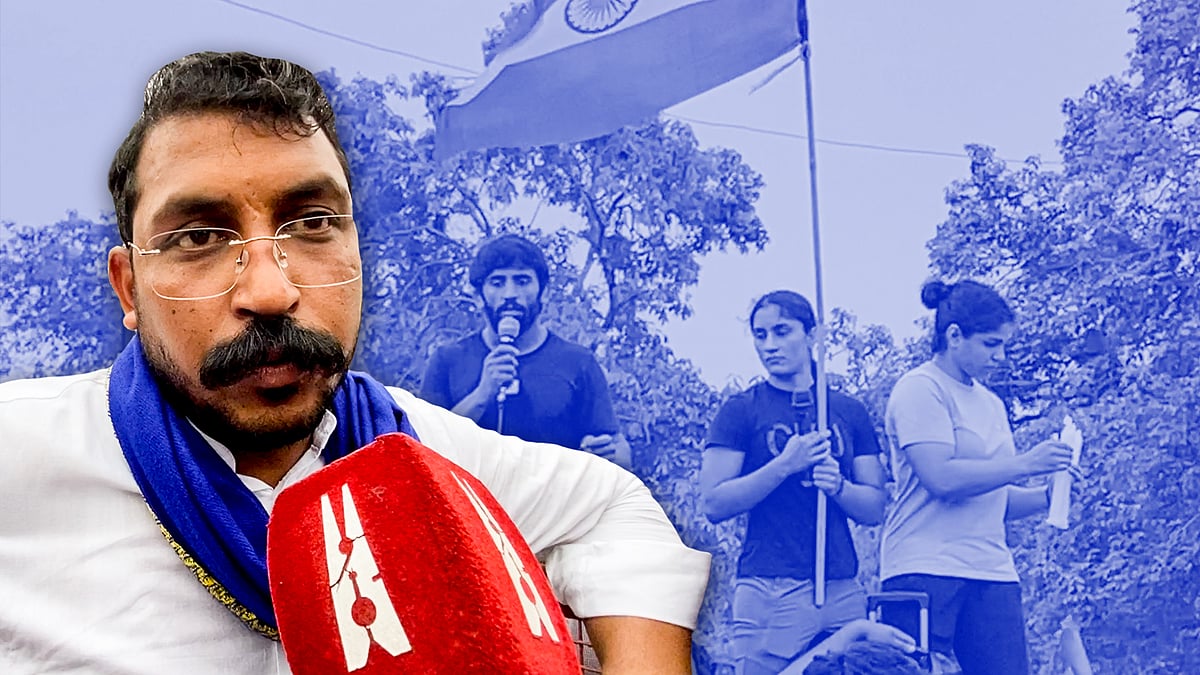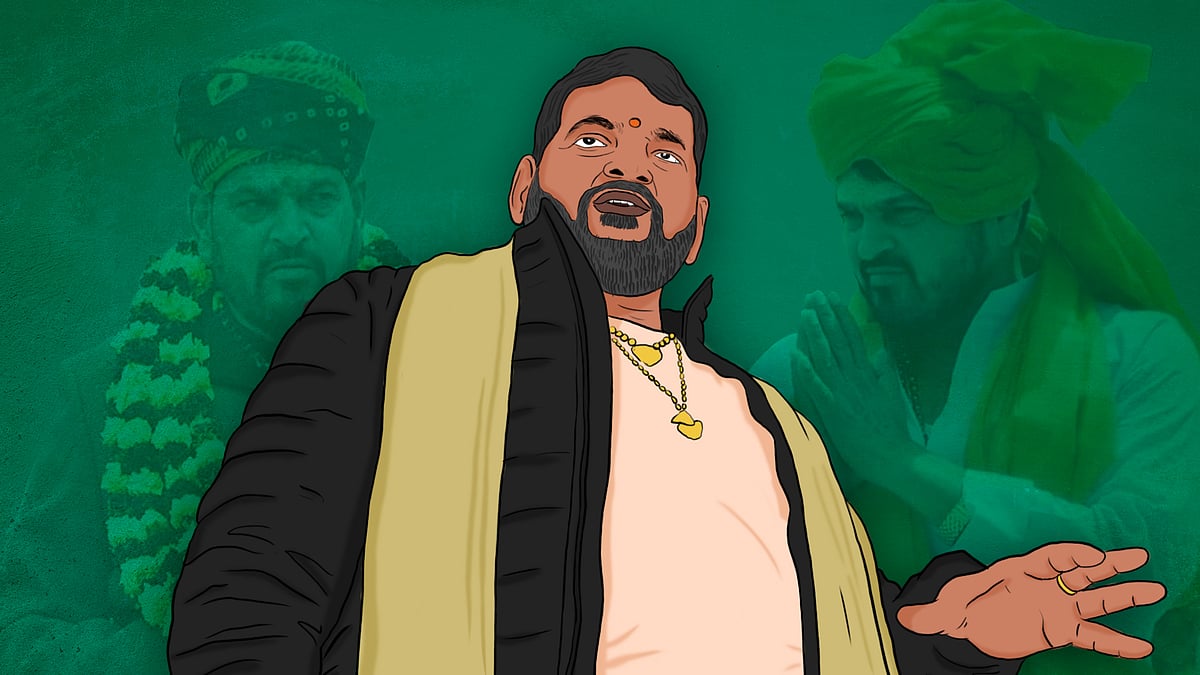How Sports Authority of India proposed, but never implemented, a code of conduct for male coaches
Male coaches resisted the plan, even though a 2017 parliamentary committee cited ‘so many instances of sexual harassment cases’.
A few months ago, when the wrestlers’ protest against Wrestling Federation of India coach Brij Bhushan Sharan Singh was in full swing, the Sports Authority of India considered introducing a code of conduct for male coaches on how to train women athletes. This was part of a diploma course on sports coaching under the National Institute of Sports, the SAI’s academic work.
But the SAI put the plan on the backburner for reasons unknown. “The reason to do so was not informed to us,” an NIS coach told Newslaundry.
The National Institute of Sports is located in Patiala, with three sub-centres in Bengaluru, Kolkata and Thiruvananthapuram. It calls itself the “mecca of Indian sports” and takes pride in producing coaches of “high calibre”. Notable alumni include kabaddi coach and player Kasinatha Baskaran and the late Balkrishan Singh Grewal, who coached the Indian hockey team that won the gold at the 1980 Olympics.
Importantly, most coaches hired by the SAI to train athletes must hold a diploma in coaching from the NIS. Exceptions are only made for “exceptionally good” sportspersons like Olympians, according to SAI deputy director Prashant Singh.
The SAI’s decision not to implement the code of conduct is even more contentious considering India’s top wrestlers have accused WFI head Singh of sexual harassment. Singh is also a BJP MP.
Colonel Raj Singh Bishnoi, senior executive director at NIS Patiala, told Newslaundry: “Yes, there has been talks to introduce a code of conduct. But I can’t talk about its implementation.”
At least three NIS coaches confirmed to Newslaundry that they currently are not bound by a code of conduct, though there are informal discussions on rules and ethics. They also confirmed there are no mandatory sensitisation programmes.
Proposed guidelines
The proposed code of conduct contains the following guidelines. “FOP” refers to the field of play, the area in which the sport is played.
(1) No one-on-one coaching, training and teaching in/on FOP [field of play].
(2) No coaching, training and teaching with closed-door FOP.
(3) Education programme for potential vulnerable athletes (female) about sexual advance and assault.
(4) No one-on-one interaction with the coach, sporting staff (physio, psychologist, conditioning expert), and federation office bearer.
(5) Athletes, coaches and sporting staff familiarity with the law of land relating to sexual harassment and assault.
Importantly, a parliamentary committee report in 2017 – titled Yoga and Sports Facilities for Women – had also pulled up the SAI for not introducing a code of conduct for its coaches.
“The Committee fail to understand why the Ministry/SAI has so far never enforced a proper Code of Conduct for the Coaches despite so many instances of sexual harassment cases against coaches cropping up. The Committee, therefore, strongly recommended that the Ministry/SAI should put a Code of Conduct for Coaches in place at the earliest,” the report said.
The report said that in “the last five years” (and the report was submitted in 2017), 24 complaints had been filed under the Sexual Harassment of Women at Workplace Act 2013 and the Protection of Children from Sexual Offences Act 2012. Twenty of these complaints were filed against coaches. The committee said the number “could be high as many times, cases against coaches might have gone unreported”.
The report also made several suggestions, including:
(1) Holding awareness classes for female trainees/coaches on sexual harassment at the workplace.
(2) Sensitising male coaches and sportspersons “about gender-sensitive behaviour on and off the field”.
(3) Displaying details of Internal Complaints Committees, “including phone numbers of those to be contacted in case of sexual abuse”, at training centres and accommodation centres for women and girls under the SAI.
(4) Creating “appropriate forums” for women sportspersons and coaches to “raise issues relating to sexual harassment”.
‘Sounds like Sharia’: Pushback from male coaches
Three coaches – who teach wrestling, athletics and badminton, respectively – at NIS Patiala confirmed to Newslaundry that there is “no proper code of conduct” to sensitise coaches on sexual harassment and laws related to it.
“A proper code of conduct should be introduced in the syllabus,” said the NIS wrestling coach. “In other countries like US and Sweden, proper discussions are held about sexual harassment. But nothing of the sort happens in the world of Indian sports.”
SAI deputy director Prashant Singh told Newslaundry that “regular seminars” are held at the NIS to address sexual abuse in sports. But an athletics coach from NIS, who has worked in the industry for 15 years, said while there was a seminar on sexual harassment last year, “it is not conducted every year like a mandatory thing for everyone”.
Newslaundry also spoke to 15 coaches who hold diplomas from NIS, all of whom passed out of the institute from 1990 to 2020, and former national coaches across sports. All 15 confirmed that the institute did not sensitise them on sexual harassment in sports and laws on the same.
Some of them don’t even see the need for it – at least four of the 15 coaches agreed that such awareness programmes will make it “tough” for them to coach women athletes.
According to an NIS source, this is one of the reasons why the SAI did not implement the code of conduct.
For instance, Ajit Singh, a former SAI wrestling coach, also NIS Patiala diploma holder, called the proposed guidelines “the most foolish proposal ever made” by SAI.
“If a coach is training a woman athlete, he will be touching her body everywhere, even her breasts and genitals, because the nature of sports is like that,” Ajith, 58, told Newslaundry. “And when a male coach touches a female body while training her, we just treat it like any other body. So there is no need for sensitisation or awareness programmes. This is all nonsensical.”
What if the code of conduct is enforced? “Then I will just stop training women athletes,” he said. “Itna bada burden leke kaun train karega bhai, kisko jail jana hai bhai?” (Who would want to train women athletes with so much burden? Nobody wants to land in jail.)
He added, “This sounds like Sharia to me. You tell me, if such strict sexual harassment laws are introduced in your office, will your male boss hire you? No. So because of these feminist ideologies, women are harming themselves.”
Virendra Dahiya, a former assistant coach to the Indian women wrestling team, got his coaching diploma at NIS 30 years ago.
“I have never felt the need for such sensitisation programmes,” he said. “You need to understand that if a woman has a good character, no one can dare say anything to her. They may be one or two percent of coaches who have bad intentions. But in the end, it all depends on the woman. After looking at these protests, from now onwards, male coaches will be more careful and are scared, which will impact training of women athletes.”
Newslaundry’s conversation with a coach, who runs a private wrestling coaching centre in Patiala, was on the same lines. He got a diploma from NIS in 1997 and spoke on condition of anonymity.
“We never felt the need for such a code of conduct but now it is required because these women wrestlers have made this into a big issue now,” he complained. “You tell me, are women allowed to drink alcohol? When we ask them not to drink, they tell us that this is their personal life. So,how can they accuse other men of sexual harassment? CBI should also inquire into their personal lives as well.”
‘There is no awareness or safe space’
Among the coaches interviewed for this report, only a few supported the idea of a code of conduct.
“It must be there to make people aware about sexual harassment, especially for minors in sports,” said Virender Poonia, a Guru Dronacharya awardee and former coach of the Indian athletics team.
But Poonia also claimed a man “will not dare touch a woman in a wrong manner if the woman is bold”. “It is a woman who encourages men,” he said, “so she should protest to stop the man there and then.”
Women coaches were more open in their support of a code of conduct.
“NIS must start awareness programmes for sexual assault in sports because every second woman is a victim of it,” said Prabhjot Kaur, a national-level gymnast who got a coaching diploma from NIS in 2016. “After years, when we discuss our instances with our fellows, we ask ourselves why we never complained about it or even told anyone. Because there is no awareness and safe space to discuss it, forget filing complaints, especially in the case of minors.”
Another issue, Prabhjot said, is that “the majority of the men in sports are not even aware about the laws against harassment and stalking. So it is important to make them aware about it so that they don’t believe that they are above the law.”
National-level basketball player Harminder Kaur said the issue needs to be understood from the point of view of “minor women athletes, who come from backward villages”.
“For them, sports is not just to build their career but fulfil their basic necessities like food, a pair of shoes, and school and college fees. And they know that if they will file a complaint or share their sexual abuse with their parents, they will be taken back to their home,,” she said. “It makes them more vulnerable. So regular awareness programmes on sexual harassment should be conducted to instil confidence in them to speak up. Because I have seen how they carry the trauma of abuse throughout their lives.”
As for male coaches, Harminder said we need “more than awareness programmes”.
“We want quick and strict actions to be taken against them,” she said. “Otherwise, what is the point?”
 ‘If law followed, Singh would’ve been in jail’: What protesters said on one month of wrestlers’ sit-in
‘If law followed, Singh would’ve been in jail’: What protesters said on one month of wrestlers’ sit-in ‘Baahubali’, braggart, all-round bigwig: Why WFI chief Brij Bhushan Singh thinks he’s above the law
‘Baahubali’, braggart, all-round bigwig: Why WFI chief Brij Bhushan Singh thinks he’s above the law